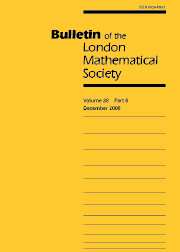Crossref Citations
This article has been cited by the following publications. This list is generated based on data provided by
Crossref.
Petrosyan, Nansen
2007.
Jumps in cohomology and free group actions.
Journal of Pure and Applied Algebra,
Vol. 210,
Issue. 3,
p.
695.
HYUN JO, JANG
and
NUCINKIS, BRITA E. A.
2008.
Periodic cohomology and subgroups with bounded Bredon cohomological dimension.
Mathematical Proceedings of the Cambridge Philosophical Society,
Vol. 144,
Issue. 2,
p.
329.
Dembegioti, Fotini
and
Talelli, Olympia
2008.
An integral homological characterization of finite groups.
Journal of Algebra,
Vol. 319,
Issue. 1,
p.
267.
Asadollahi, Javad
Bahlekeh, Abdolnaser
and
Salarian, Shokrollah
2009.
On the hierarchy of cohomological dimensions of groups.
Journal of Pure and Applied Algebra,
Vol. 213,
Issue. 9,
p.
1795.
Dreesen, D.
and
Petrosyan, N.
2010.
Fiberwise volume non-increasing diffeomorphisms on product manifolds.
Geometriae Dedicata,
Vol. 149,
Issue. 1,
p.
417.
Emmanouil, Ioannis
2010.
On certain cohomological invariants of groups.
Advances in Mathematics,
Vol. 225,
Issue. 6,
p.
3446.
JO, JANG HYUN
2010.
ON GROUPS OF TYPE $\mathcal{L}^{-1}$.
International Journal of Mathematics,
Vol. 21,
Issue. 06,
p.
727.
Talelli, Olympia
2011.
A characterization of cohomological dimension for a big class of groups.
Journal of Algebra,
Vol. 326,
Issue. 1,
p.
238.
Talelli, Olympia
2012.
On Periodic (Co)Homology of Groups.
Communications in Algebra,
Vol. 40,
Issue. 3,
p.
1167.
Hajizamani, A.
2012.
On Groups with Periodic Relative Cohomology.
Communications in Algebra,
Vol. 40,
Issue. 2,
p.
429.
Asadollahi, Javad
Hajizamani, Ali
and
Salarian, Shokrollah
2012.
Periodic flat resolutions and periodicity in group (co)homology.
Forum Mathematicum,
Vol. 24,
Issue. 2,
Asadollahi, Javad
and
Salarian, Shokrollah
2012.
Cohomology theories based on flats.
Journal of Algebra,
Vol. 353,
Issue. 1,
p.
93.
Ballas, Dimitrios
2013.
On Cohomological Periodicity After 2-Steps.
Communications in Algebra,
Vol. 41,
Issue. 8,
p.
2815.
Emmanouil, Ioannis
and
Talelli, Olympia
2014.
Finiteness criteria in Gorenstein homological algebra.
Transactions of the American Mathematical Society,
Vol. 366,
Issue. 12,
p.
6329.
JO, JANG HYUN
2015.
ON ALGEBRAIC INVARIANTS FOR FREE ACTIONS ON HOMOTOPY SPHERES.
Bulletin of the Australian Mathematical Society,
Vol. 92,
Issue. 3,
p.
478.
Ballas, Dimitrios
2017.
On certain homological finiteness conditions.
Communications in Algebra,
Vol. 45,
Issue. 2,
p.
481.
Golasiński, Marek
Gonçalves, Daciberg Lima
and
Jimenez, Rolando
2018.
Free and Properly Discontinuous Actions of Groups on Homotopy 2n-spheres.
Proceedings of the Edinburgh Mathematical Society,
Vol. 61,
Issue. 2,
p.
305.
Emmanouil, Ioannis
2019.
On the relation between K-flatness and K-projectivity.
Journal of Algebra,
Vol. 517,
Issue. ,
p.
320.
Biswas, Rudradip
2022.
Injective generation of derived categories and other applications of cohomological invariants of infinite groups.
Communications in Algebra,
Vol. 50,
Issue. 10,
p.
4460.
Emmanouil, Ioannis
2023.
K-flatness and orthogonality in homotopy categories.
Israel Journal of Mathematics,
Vol. 255,
Issue. 1,
p.
201.


